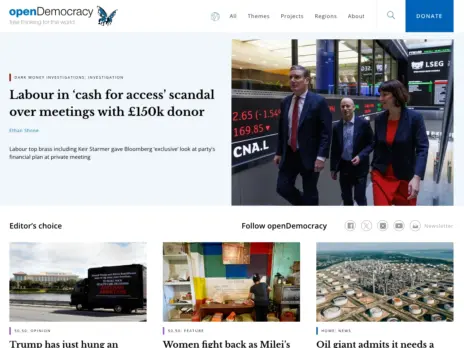
The UK’s largest press regulator, its main trade body, a group of regional editors and the National Union of Journalists are among those calling on digital giants like Facebook and Google to “give something back” to publishers.
The groups made submissions this month to the Cairncross Review into the sustainability of high-quality journalism in the UK, launched by the Government in response to industry-wide decline in print circulations and ad revenues.
However, alternative press regulator Impress said it did not back calls to reform the digital advertising market as part of the official review, saying this should be done as part of a wider review into digital accountability.
Press Gazette launched its Duopoly campaign last year warning that the dominance of Google and Facebook in the advertising market was pushing news publishers out of business.
In our own submission to the review, which closed to the public earlier this month, Press Gazette said: “If a way can be found to siphon some of the billions in revenue made by the US digital giants into supporting high-quality local journalism we argue that would provide a huge social good.”
The News Media Association, the main trade body for news publishers in the UK, laid out the challenges facing the industry in its own submission.
It said: “The primary focus of concern today is the loss of advertising revenues which have previously sustained quality national and local journalism and are now flowing to the global search engines and social media companies who make no meaningful contribution to the cost of producing the original content from which they so richly benefit.”
The NMA proposed a “fair, open and equitable” content licence fee agreement, supported by a UK Publishers Right, to ensure the tech companies pay for the content from which they benefit.
Publishers would have to meet a set of criteria, such as being regulated by the Independent Press Standards Organisation or following the Editors’ Code of Practice, to be eligible, the NMA said.
NLA Media Access, the rights licensing and database business owned by news media publishers, suggested its own system for licensing news media content to media monitoring organisations could, in principle, be a possible route for licensing the tech platforms.
The NMA also called for a competition inquiry into the dominance of the tech platforms, greater transparency over algorithms on their sites, and said they should be given the same legal responsibilities as publishers for content they carry unless it comes from a bona fide news source.
The group said: “Successful solutions would result in search engines and social media companies recognising that genuine news is the vital component of engagement with their platforms and that it is in their long-term interests actively to promote it over fake news and other harmful content.”
IPSO summarised the two main challenges facing the news industry in the UK: falling revenues as more people get their news online, and fake news.
“It’s the smaller local papers that are least well-equipped to deal with financial pressures, and many have closed in the last ten years,” IPSO said.
“It’s a problem for democracy if whole communities are poorly served by high quality news, with fewer journalists to scrutinise the decisions of the powerful or cover and campaign on local issues.”
IPSO said it was against direct subsidies from the Government “as this would threaten the press’s independence”.
It suggested instead that the Government could look to the online advertising market “in an effort to address inequalities at the heart of profiting from digital advertising revenue”.
Regarding fake news, IPSO said the dissemination of online disinformation, often through social media, had “little antidote” without a thriving press.
“The effect this might have on the public’s ability to participate meaningfully in society should be of concern to us all,” it added.
Although IPSO said “action needs to be taken to limit harmful fake news which can erode trust in the press”, it offered no concrete solutions other than independent press regulation and initiatives to better inform the public.
Rival regulator Impress surveyed its 111 members and told Cairncross there was “considerable discontent” among independent news publishers about the share of data and revenues they receive from digital intermediaries such as social media platforms.
The regulator said only 8 per cent of its members believe their financial arrangements with social media platforms – in which they publish content and/or links to their content and receive almost no income in return – are fair.
One member told Impress: “Whilst social media platforms are under no obligation to reward content creators, we would certainly support measures that would see a more equitable revenue share between social media platforms and content creators where content we produce has generated a lot of engagement – and thus value – for the platform.
“That said, as a digital-only media brand, social media platforms play an important role in promoting our content and helping us to reach new audiences.”
One publisher told Impress “subsidies would be helpful” while another said: “We would support measures that would see a more equitable revenue share between social media platforms and content creators.”
However Impress did not support changes to the mechanics of the digital advertising market or the operation of tech giants like Facebook and Google as part of the Cairncross Review.
It said such reforms should be made in the context of a wider review of digital accountability, not simply in the context of digital intermediaries’ impact on high-quality journalism for fear of missing “the bigger picture”.
It suggested that if changes are made “solely to improve the situation of news publishers” they may have “perverse consequences such as inhibiting freedom of expression for the individual users of digital intermediaries, or stifling innovation in the digital sector”.
Impress also said some publishers of high-quality journalism “may require public support in order to compete effectively in the digital media economy”, but that any such support “should be sufficiently selective so that it does not inadvertently benefit the publishers of low-quality journalism, misinformation or disinformation”.
The National Union of Journalists told Cairncross there is “no one-size-fits-all solution to the current media crisis” which has resulted in “extremely challenging circumstances” for journalists, it said.
It added that “structural patterns across the largest publishing groups show the implementation of failing business models, extensive job cuts and derisory working conditions”.
The NUJ said: “[We are] calling for an economic stimulus plan for the media including arms-length government subsidies, the strategic use of central and local government advertising, tax credits, tax breaks, and a combination of funding such as grants, loans and community-share schemes.”
It added that any new funding should be attached to specific objectives and criteria including quality and ethical standards which would mean “organisations that systematically cut corners and rely upon free content and user-generated pictures” are not entitled to support.
Regarding the tech giants, the NUJ said: “Digital platforms have already been able to generate immense profits from leveraging content made by journalists and now they should give something back.
“Companies that have financially benefited by reproducing news content but not creating it should now be compelled to contribute to society by funding journalism via a levy or tax.”
This sentiment was shared by a group of editors representing each of the local titles owned by Johnston Press.
The editors wrote a letter to Cairncross sharing concerns over the role the tech companies have played in “accelerating the demise of the traditional funding model for journalism”.
They suggested the Review finds a way of forging a “regulated partnership” in which the tech companies can pay for and reward content from regulated publishers which fulfils the description of quality journalism.
The letter said: “…We look to you [the review] to establish a contract between the creators of quality journalism and the tech companies so that while they benefit from our trusted content and the audience and brand values it generates for them we receive a fair share of the revenues generated.”
Picture: Pixabay
Email pged@pressgazette.co.uk to point out mistakes, provide story tips or send in a letter for publication on our "Letters Page" blog






